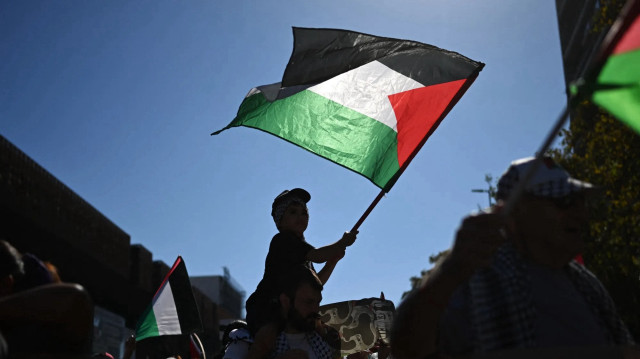
Australia, Japan, South Korea, New Zealand, Taiwan and Singapore are among several Asia-Pacific nations yet to recognize Palestine
Israel’s latest plans to ramp up its already catastrophic assault on Gaza and move toward reoccupation have come at a time when there is a growing wave of worldwide momentum for recognizing Palestinian statehood.
France, the UK, and Canada – three major Western allies – have announced plans to formally recognize Palestine at the UN General Assembly in September. The renewed drive for recognition comes as Israel’s war on Gaza approaches its 22nd month, leaving more than 60,000 Palestinians dead, over 2 million facing starvation, and Gaza’s infrastructure in ruins.
To date, nearly 150 of the UN’s 193 member states have recognized Palestine, a number that has steadily increased since Israel launched its war on Gaza in October 2023, with Spain, Ireland and Slovenia joining the list in 2024.
However, several nations in the Asia-Pacific region have refrained from extending recognition, including major Western allies such as Australia, Japan and South Korea.
- Asia-Pacific countries yet to recognize Palestine
Australia
Prime Minister Anthony Albanese recently confirmed that Canberra will recognize a Palestinian state, saying it is “only a matter of when and how.”
He stressed the decision would uphold “the right of Israel to exist within secure borders and the right of Palestinians to have their legitimate aspirations for their own state.”
Australia backs a two-state solution and provides humanitarian aid to Palestinians but has not yet conferred formal recognition, though it has maintained a representative office in Ramallah since 2000.
Japan
Japan opposes any action that undermines a two-state solution, citing the “grave humanitarian crisis” in the Gaza Strip “marked by hunger and malnutrition.”
“Japan fully recognizes the legitimate aspirations of the Palestinian people to create an independent state,” Tokyo’s Middle East peace envoy Uemura Tsukasa said at a UN conference.
However, Japan has not given a timetable for recognition, despite providing humanitarian aid and supporting the two-state framework.
South Korea
Seoul does not recognize Palestine as an independent state or maintain diplomatic ties, though it acknowledges the Palestinian Authority as its sole representative.
New Zealand
New Zealand supports a two-state solution with secure borders and Palestinian self-determination but has not extended formal recognition, urging direct negotiations instead.
Singapore
Singapore says it is “prepared in principle” to recognize Palestine but insists the move must advance peace and a negotiated two-state solution.
“Singapore has consistently supported the right of the Palestinians to their own homeland based on a negotiated two-state solution,” its UN envoy Kevin Cheok said. Singapore also has long-standing ties with Israel.
Taiwan
Taiwan does not recognize Palestine and has no formal diplomatic relations.
Myanmar
Myanmar does not recognize Palestine. It was the first Southeast Asian country to recognize Israel in 1953 and has maintained close ties, including military cooperation, with arms supplied by Israel used in Myanmar’s crackdown on the Rohingya.
Nepal and Bhutan
Nepal supports a two-state solution but does not formally recognize Palestine. It was one of the first South Asian countries to establish ties with Israel, taking the step in 1960. Bhutan also does not recognize Palestine, but established relations with Israel in 2020.
Pacific Nations
Several Pacific Island countries are yet to recognize Palestine: Fiji, Kiribati, Micronesia, Nauru, Samoa, Solomon Islands, Marshall Islands, Palau, Tuvalu, and Tonga.
- Why the holdout?
Jake Lynch, a sociology professor in Australia, says political pressure is rising but remains insufficient in some countries to push governments beyond symbolic concessions.
“In Australia, the pressure is increasing but evidently not yet enough to prompt any more than rhetorical and other low-cost concessions to the protest movement,” he said, noting the UK example where Prime Minister Keir Starmer shifted position after lawmakers broke away to form a new party.
Experts point to Washington’s influence as a major factor. “This can be explained by the influence of the US and Christianity, as well as the division of the country,” said Han-jin Eom, sociology professor at Hallym University, referring to South Korea.
South Korea’s post-war history is closely tied to US support, from the Korean War to deployments alongside US forces in Vietnam, Iraq, and Afghanistan. “In this historical context, South Korea, like Japan, follows the US’ position on the Palestinian issue,” he said.
Religion also plays a role. “About 30% of South Korea’s population is Christian, and about 40% of its lawmakers are Protestant,” he noted.
“A lot of people in South Korea see North Korea as the enemy and think of South Korea as being like Israel, which is surrounded by Arabs, and they feel close to Israel and Jews, thinking of Koreans as the Jews of Asia.”
He added that the Korean Peninsula’s own division mirrors, in some ways, the Israeli-Palestinian conflict: “Although there is no direct connection, the similar situations of the Korean Peninsula and Palestine are one of the reasons why the South Korean government does not recognize Palestine as a state.”
Han-jin argued that even governments with more progressive domestic agendas are unlikely to break with Washington on Middle East policy.
“From the perspective of the new Korean government, which desperately needs friendly relations with the US amid Trump’s tariff war, it seems difficult to pursue a Middle East policy that differs from that of the US.”
South Korea and Japan have both engaged in trade talks with the US to ease tariffs imposed by the Trump administration, making them even less likely to risk diplomatic friction over Palestine. “It is difficult to expect anything more than participation in humanitarian aid for the Palestinians,” he said.
“However, unlike the government, many citizens criticize Israel, and civil society organizations are actively engaged in solidarity movements with Palestine. Since the current government came to power largely due to the power of the people, it is expected that these movements in civil society will influence government policy.”







